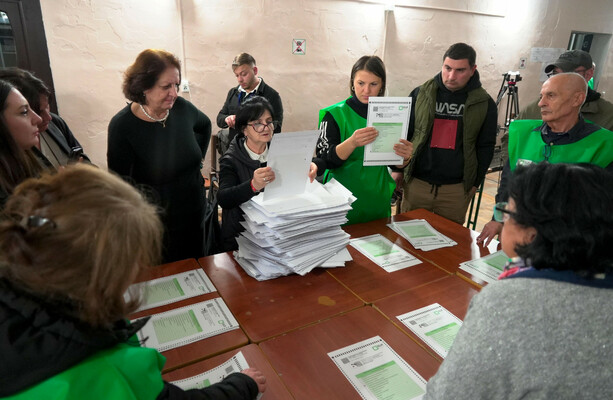Headline: Georgia’s Ruling Party Claims Election Victory Amid Fraud Allegations
Georgia’s ruling party has declared victory in the recent elections, amidst brimming tensions with the pro-EU opposition, which claims widespread electoral fraud. The political climate remains fraught as the opposition decries the legitimacy of the recent vote, sparking concerns for the nation’s democratic integrity and potential shifts in foreign policy directions.
Election Overview
On October 28, 2023, the Central Election Commission of Georgia announced that the ruling party, led by Prime Minister Irakli Garibashvili, secured a significant number of parliamentary seats in a vote deemed critical for the nation’s future. However, the pro-European opposition, primarily made up of the United National Movement (UNM) and other pro-Western factions, immediately raised alarms, alleging irregularities and manipulations that compromised the electoral process.
Barring few, over 51% of the voters were reported to have favored the ruling coalition, which has been characterized by its growing ties with Russia under the influence of billionaire Bidzina Ivanishvili. Critics argue that Ivanishvili’s substantial economic control and political maneuvering raise questions about the independence of Georgian’s political institutions.
Allegations of Electoral Fraud
The opposition’s claims center around issues of transparency, voter intimidation, and alleged media bias favoring the ruling party. A spokesperson for the UNM stated, "This election was stolen from the people of Georgia. We demand an investigation into these irregularities. The integrity of our democracy is at stake."
International observers reported a tense atmosphere at polling stations, with numerous accounts of voters feeling coerced and misinformed about their rights. Unlike previous electoral cycles, this election saw a reduced presence of independent monitors, raising further concerns regarding oversight, fairness, and accountability.
Context: A Divided Georgia
Georgia, a small nation at the crossroads of Europe and Asia, has a complex political backdrop. Since gaining independence from the Soviet Union in 1991, it has oscillated between pro-European and pro-Russian sentiments. The current ruling party’s pivot toward Russia has been largely attributed to billionaire Bidzina Ivanishvili, whose influence over Georgian politics has drawn criticism from various quarters.
In discussions with political analysts, Dr. Nino Abashidze, a professor at Tbilisi State University, remarked, "The correlation between economic power and political influence can undermine citizens’ trust in democracy. The implications of this election extend beyond the immediate political landscape; they can alter Georgia’s integration into Euro-Atlantic structures."
The Implications for Georgia’s Future
The outcome of this election holds critical implications for Georgia’s foreign relations and public sentiment. Should the ruling party consolidate power, the nation could lean even further into a partnership with Russia—an outcome that many pro-European supporters and activists fear may jeopardize Georgia’s aspirations to join the European Union and NATO.
Moreover, the claims of electoral irregularities could incite protests or civil unrest among the opposition factions, which could pose significant challenges for the ruling party. Political analyst David Zaalishvili noted, "If the government does not address these concerns, the risk of instability could hamper economic growth and alienate Georgia from its Western allies."
Public Reactions and Next Steps
Public reactions are already unfolding, as the opposition has indicated plans to organize protests and rallies against the electoral outcome. Many citizens lament the perceived erosion of democratic values and express frustration with both the ruling coalition’s tactics and the lack of accountability.
In a statement, opposition leader Levan Khabeishvili asserted, "We will not stop fighting for the real interests of our citizens. Our struggle is not just about power; it is about our identity, our aspirations as a European nation."
Final Thoughts
As Georgia navigates these turbulent political waters, the international community watches closely. The outcome of these elections not only affects Georgia’s trajectory but also impacts broader geopolitical dynamics in the region.
We invite you to share your thoughts on the situation in Georgia. How do you believe the electoral integrity can be restored, and what potential impacts do you foresee on the nation’s future?
For more information on Georgia’s political landscape, visit our related articles on this website. For an in-depth look at the role of Bidzina Ivanishvili in Georgian politics, check out this article from The Guardian.
[Insert relevant images and multimedia elements here]
By maintaining an unbiased tone and providing equitable representation of various perspectives, we ensure that our readers remain well-informed. Your engagement is important to us—share, comment, and join the conversation on Georgia’s crucial political developments.

